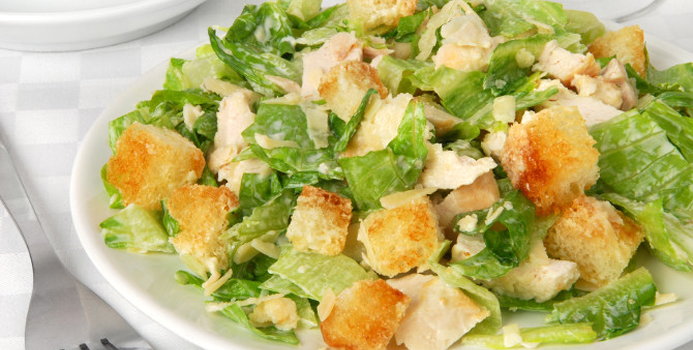Croutons are crunchy bite-sized pieces of bread. The bread that is used to make croutons can be any kind of bread, including white, rye, wheat, sourdough and French, and it has to be at least one day old. Croutons are coated with either olive oil or butter, and they can be fried in oil or baked. Some of the seasonings that are commonly used for making croutons are salt, Parmesan cheese, garlic, sage and thyme. Croutons were first introduced in France during the 17th century, and they were served with drinks at that time. Today, they are commonly used in salads and soups to provide a crunchy texture as well as better nutrition. Here's a look at the nutrition of croutons.
Basic Nutrition for Plain Croutons
There are 122 calories, 22 grams of carbohydrates and 3.6 grams of protein in 30 grams of croutons. If the calorie intake is 2,000 per day, this amount of croutons will supply about 6 percent of the daily value that is recommended for calories, and 7 percent of the daily value for carbohydrates and proteins. It also provides around 1.5 grams of dietary fiber, which represents 6 percent of the recommended daily value.
Vitamins
The USDA Nutrient Database reveals that croutons have a dietary folate equivalent of 63 micrograms, which makes up approximately 15 percent of the daily recommended intake, which is 400 micrograms. Croutons are a good source of vitamin B, and it delivers 0.2 milligram of thiamin or 12 percent daily value, 1.6 milligrams of niacin or 8 percent daily value, and 0.1 milligram of riboflavin or 5 percent daily value.
Minerals
Croutons contain 11.2 micrograms of selenium, an essential trace mineral that helps antioxidant enzymes function effectively. This amount represents 16 percent of the recommended daily value. Croutons also provide 22.8 milligrams of calcium, 1.2 milligrams of iron, 9.3 milligrams of magnesium, 34.5 milligrams of phosphorous, 37.2 milligrams of potassium, 0.1 milligram of manganese, 0.3 milligram of zinc and 0.049 milligram of copper. The amount of sodium present in croutons is 209 milligrams, which is about 9 percent of the daily value.
Fats
There are 2 grams of fat in 30 grams of croutons, and this fat is made up of 1.3 grams of unsaturated fats and 0.5 grams of saturated fats. Croutons also have fatty acids that are essential for heart health, which include 361 milligrams of omega-6 and 21 milligrams of omega-3. These amounts represent 1.8 percent of the recommended omega-6 daily value and 1.25 percent of the omega-3 daily value for men, and 3 percent of omega-6 and 1.8 percent of omega-3 daily value for women.
Nutrition of Seasoned Croutons
The USDA Nutrient Database states that seasoned croutons are more nutritional than plain croutons. In 30 grams of seasoned croutons, there are 186 calories and 7 grams of fat, which consists of 4.7 grams of unsaturated fat and 2.1 grams of saturated fat. As for vitamins, seasoned croutons provide double the amount of riboflavin, as well as 0.2 milligrams of vitamin E and 3 micrograms of vitamin K. Other vitamins and minerals have increased daily values of 1 to 2 percent.



